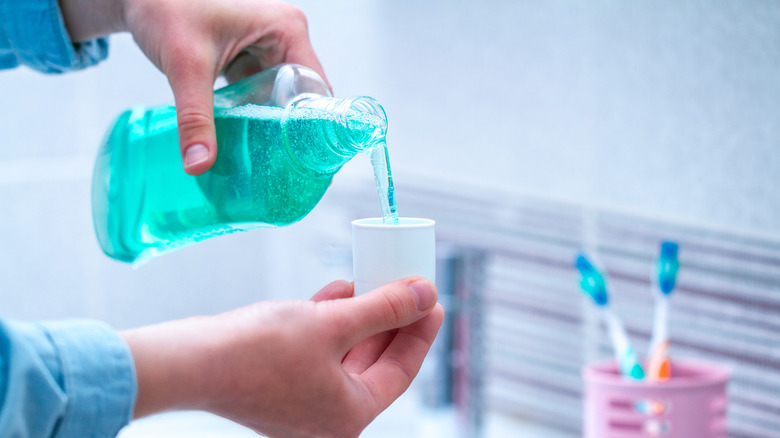If You Have A Canker Sore That Just Won't Go Away, Here's What You Should Do
Canker sores, ulcers that impact the lining of the mouth, can be painful and make even the most basic things like eating or talking a challenge. Unlike cold sores, however, canker sores aren't caused by a virus or sexually-transmitted disease. They aren't contagious and can't be transmitted via any form of contact, such as kissing. They are, however, one of the most common conditions when it comes to infections in the mouth, affecting approximately one in every 10 people.
The good news when it comes to canker sores is that, generally speaking, they don't tend to last too long. Most canker sores will go away on their own within a week or so. The less common sores, known as major canker sores, will take slightly longer — approximately two weeks — to heal. However, there are times when a canker sore won't heal on its own, even after a week or more, and you may have to see a doctor to have it addressed.
There may be an underlying condition behind your sore
The more stubborn type of canker sore is known as a complex canker sore, and these can linger for a month, leaving a scar once they do heal (via Medical News Today).
A 2017 study from the University of Gothenberg suggests that the best canker sore treatment may not be treating the sore itself, but getting to the root of what's causing it. These sores are usually triggered by a health condition, such as a vitamin deficiency, a viral infection, Crohn's disease, or an autoimmune deficiency. If you have a sore that lingers longer than a couple of weeks, or if you develop a fever, it's advisable to see a doctor, as he or she can try and determine whether you're dealing with a lingering canker sore or an underlying ailment that may need separate treatment.
According to Aphthous Stomatitis, there are some over-the-counter methods you can use to treat canker sores, including topical anesthetics like benzocaine to help manage the discomfort, pain relievers such as ibuprofen and acetaminophen to deal with both the swelling and the pain, and antiseptic treatments like hydrogen peroxide, which can kill off bacteria and accelerate the healing process. More persistent cases may need steroid treatments or antibiotics in order to get them under control.
Taking care of your mouth can make a big difference
Canker sores have a way of coming back, particularly in adults, according to the Merck Manual. That report noted that, in cases of recurring canker sores, 80% of patients were over 30. These canker sore attacks can be brought on by a variety of factors, including mouth injuries, stress, and foods such as coffee, peanuts, and chocolate.
Given the likelihood of recurring canker sores, it's important to take preventative measures to try and keep them at bay. These measures include being mindful of what you eat, as spicy or acidic foods can trigger sores. Making healthy eating choices is important in general, as a nutritious diet packed with fruits, vegetables, and whole grains can help stave off sore-forming nutritional deficiencies. In addition, you can practice good oral hygiene and try to reduce your stress. Taking care of your mouth can go a long way to keeping sores from cropping up.



